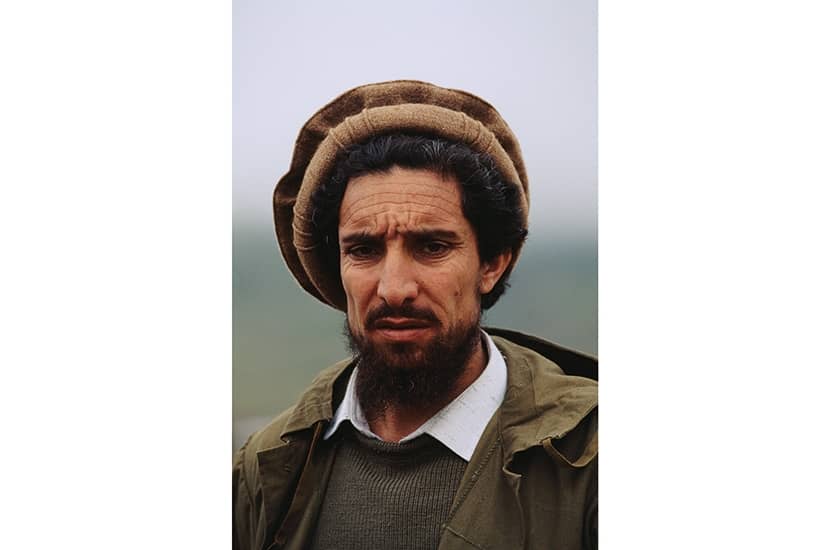Ahmed Shah Massoud was described as ‘the Afghan who won the Cold War’. While famous in France (he was educated at the Kabul lycée, and the French saw him as the ultimate maquisard who drove a super-power out of his country), he is not a familiar figure in Britain. This book, a rich and detailed account of the travails and tragedy of Afghanistan between 1976 and Massoud’s murder in 2001, will correct that.
Sandy Gall’s knowledge of the jihad is encyclopaedic. He was the first well-known journalist to make the dangerous journey into occupied Afghanistan and bring the human cost of this terrible war to our TV screens. To produce such a book at the age of 93 deserves admiration.
Many warlords are also writers: Babur, T.E. Lawrence, Churchill and, as we now know, Massoud, who kept a diary throughout the jihad. In a tremendous scoop, Gall obtained access to some of these hand-written exercise books. They are an extraordinary document, being a detailed account of the war and also self-revealing. Massoud admitted: ‘My weakness in oratory has caused me to lose great opportunities — but I am not bad at writing.’ His remarkable personality is obvious — generous, forgiving and always careful to attribute the key Afghan virtue of honour even to his opponents. He commanded huge loyalty from everyone who met him.
A strength of Gall’s book is its detailed discussion of Pakistan’s malign interference in Afghanistan, where the Taliban are their proxy force. Massoud wrote: ‘It is the aim of Pakistan to see the Afghan state and its institutions collapse totally.’ What has happened there from the 1980s onwards has been dictated by the Pakistani secret service, the ISI. They grandiloquently call it ‘strategic depth’, which I suspect means removing the threat of a two-front war in case of hostilities with India. Pakistani troops were seen fighting alongside the Taliban during their 1996 conquest of Kabul. Massoud’s greatest strategic mistake was not to have destroyed them and Gulbuddin Hekmatyar’s troops the previous year when he held the military advantage.
Hektmatyar was Massoud’s longest-term foe, and their personal and ideological differences went back to their time as contemporaries at Kabul University. Thuggish, fanatical and highly ambitious, Hekmatyar was Pakistan’s catspaw and the most significant factor in the collapse of Afghanistan. (‘Hekmatyar will sleep with anyone to make himself king of Afghanistan,’a shrewd observer told me in Herat in 1994.)
A pivotal moment in the book is what is known as the Afshar Massacre, when (Human Rights Watch allege) Massoud’s forces massacred Hazara civilians caught between Massoud and Hekmatyar’s troops in Kabul. The CIA used this as an excuse not to back Massoud, condemning him as a bloodstained warlord. But Gall shows convincingly that Massoud did not order any reprisals against the Hazaras and that the massacre was a case of score-settling between the Hazaras and Massoud’s then ally Abdul Sayyaf (a sinister Wahabbi mujahedin leader who trained Khaled Sheikh Mohammed, the architect of 9/11).
The book makes clear the chain of disastrous misjudgments by the US in failing to support Massoud and, almost unbelievably, actually favouring a Taliban takeover in 1996. A court would find the US guilty of contributory negligence in the events in Afghanistan leading up to 9/11.
On 9 September 2001, Massoud was murdered by two Arabs posing as journalists — highly unconvincingly, as I can attest, having met them before the assassination. How did such obvious phonies get to see him? Their letter of accreditation was from a non-existent news agency, and their Pakistani visas were invalid for the period they were in the country. When I arrived at Massoud’s HQ the previous month, Asim, the head of security, rang Massoud’s brother to check I was genuine. Why he failed to do the same with these people has perplexed me ever since. But Gall, in a brilliant piece of investigative reporting, has established that Asim had been given $10,000 — a fortune in Afghanistan.
Asim pestered Massoud to see the ‘journalists’, and finally he agreed. Their camera, placed unnaturally close to Massoud, was full of explosives and the ‘cameraman’ detonated it as the interview began. Both he and Asim were killed outright and Massoud died ten minutes later.
His assassination was especially tragic because, Gall believes, he was the one man who could have ensured Afghanistan a democratic future. He was as skilled in politics as he was in military command, telling his son: ‘To capture Kabul is easy, but hard to hold it: you need a strong political structure.’ The past 20 years have shown how right he was, and his vision, prestige and authority could have created that structure.
In the weeks before his murder Massoud seems to have known his time on Earth was about to end. He did not fear death. He pointed out a spur overlooking his village in the Panjshir where he wanted to be buried and where he now lies. He spent his last night reading the poetry of Hafez, about the transience of life, with his closest friend, Masood Khalili. All his admirers can now do is pray that — in the words of the epitaph for Babur in his burial garden in Kabul — ‘his rest is now in the garden of heaven’.






Comments